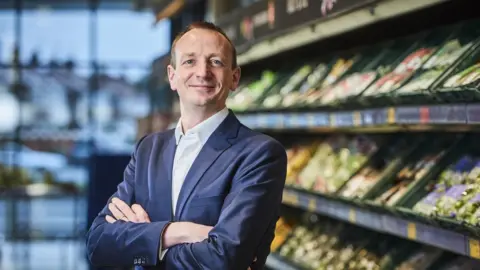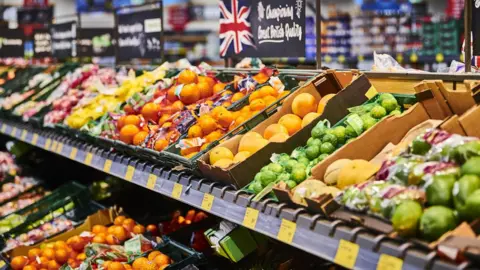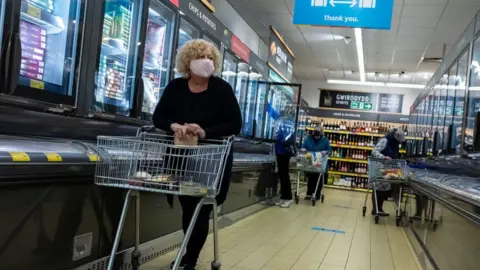Aldi says deliveries normal despite lorry driver shortage
 Aldi
AldiThe boss of supermarket chain Aldi UK has told the BBC he doesn't envisage any disruption for customers this Christmas.
There have been dire warnings about food shortages and empty shelves due to a chronic shortage of heavy goods vehicle (HGV) lorry drivers.
But chief executive Giles Hurley says his deliveries are moving as normal.
"There's no doubt current circumstances are testing the industry...but it's business as usual for us," he said.
Like many other retailers, Aldi, Britain's fifth biggest supermarket, had to increase salaries for its delivery drivers, however it won't reveal by how much.
"At the moment, we're well set, but I have to say we're never complacent," said Mr Hurley. "We're always recruiting, always have done and that won't change."
Retailers are starting to ramp up their supplies to ensure everything is in place for peak festive trading.
This year, the battle for consumers' Christmas spend won't just be about who has the best products - it's shaping up to be a contest over who can keep the shelves full.
Mr Hurley is feeling confident: "I think we're uniquely placed to weather the storm - we have a refined range and fewer suppliers.
"We actually employ more of our drivers directly than a majority of the market and on leading terms and conditions and finally a lot of what we source is British and that means our supply chains are a little shorter and easier to control."
2020 was challenging for the discounters as huge numbers of shoppers moved to online grocery shopping. For the first time in a decade, Aldi and Lidl lost market share to their rivals.
Store expansion
 Aldi
AldiIn figures just released, Aldi saw its sales for the 12 months to December 2020 grow by 10% to £13.5bn, while pre-tax profits dipped by 2.5% to £265m.
Aldi has also announced £1.3bn of investment over the next two years as it pushes ahead with its store opening plan. The supermarket chain wants to add another hundred stores in 2022 and 2023, creating 2,000 new jobs.
Fraser McKevitt, head of retail and consumer insight at market research firm Kantar, says the discounters are quickly making up for the ground they lost.
"During the lockdowns people tended to do all their shopping in one place which favoured the big four retailers," he told the BBC.
"Shoppers are now more comfortable being out and about again and are happy to visit multiple stores to get what they need - that's good news for Aldi and Lidl, which typically benefit from people making those combination shops."
With a cost of living squeeze looming this winter, discounters will hope to gain more business, he says.
Aldi says that in the last 12 weeks alone, it has already welcomed 600,00 new customers to its stores.
But food prices are also starting to pick up, as retailers face a host of rising costs, from boosting driver pay to increasing commodity prices, packaging and shipping costs.
 SOPA Images
SOPA ImagesSome of those costs will have to be passed on to shoppers - the question is how much.
Tesco's chairman John Allan has warned that food prices could rise by up to 5% this winter. Mr Hurley isn't concerned, however.
"Well look if that's what Tesco deliver, I think that's great for our business, because that means that we'll just see the price gap widen," he said.
Although no one in the grocery industry is immune to inflation, he feels Aldi has a "very unique business model", which means the supermarket chain will be able to "insulate customers far better than anyone else".
However many shoppers will be tightening the purse strings this autumn and shop prices, as well as availability of products, will be a key focus for consumers.
Grocery expert Bryan Roberts believes all retailers are facing a tricky Christmas with supply chain issues, during a period when the big supermarkets traditionally do well as shoppers are willing to spend more on products.
"Compared to the 2008 financial crisis, when Aldi received a massive boost, the big supermarkets are in a much better place to defend themselves, with two of the big four matching Aldi's prices on key items and all of them massively improving their economy own label ranges and investing in lower prices," he said.